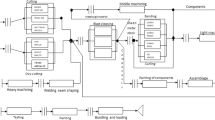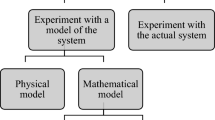Abstract
The present study brings forward a simulation-based study of the production process of a Portuguese bakery. The main goal is to analyse different production processes and propose improvements, through the use of discrete event simulation. A relevant set of data was collected, and four productive processes were selected to be modelled using Simio software (Simulation Modelling based on Intelligent Objects). The analysis of the developed models highlighted the need for improvements and different scenarios were created to this purpose. Among the obtained results, it was found that the adoption of mixed production scenarios allowed the increase of the production level while maintaining the current existing resources. In conclusion, this study highlighted the ability of the simulation technique to analyse manufacturing processes, throughout the creation of different scenarios, providing insights on the production process optimising the companies’ productive performance.
Access this chapter
Tax calculation will be finalised at checkout
Purchases are for personal use only
Similar content being viewed by others
References
Decock, P., Cappelle, S.: Bread technology and sourdough technology. Trends Food Sci. Technol. 16, 113–120 (2005)
Tsarouhas, P.H., Arvanitoyannis, I.S.: Reliability and maintainability analysis of bread production line. Crit. Rev. Food Sci. Nutr. 50(4), 327–343 (2010)
Shannon, R.E.: Introduction to the art and science of simulation. In: Proceedings of the 1998 Winter Simulation Conference (WSC), pp. 7–14. IEEE (1998)
Smith, J.S., Sturrock, D.T., Kelton, W.D.: Simio and simulation: modeling, analysis, applications. Simio LLC (2018)
White, K.P., Ingalls, R.G.: Introduction to simulation. In: Proceedings of the 2009 Winter Simulation Conference (WSC), pp. 12–23. IEEE (2009)
Iucksch, A.M.: Simulação de sistemas de gestão de produção em manufatura sazonal. Rio Grande do Sul, Brasil (2005)
Banks, J.: Introduction to simulation. In: Proceedings of the 2000 Winter Simulation Conference (WSC), pp. 9–16. IEEE (2000)
Carson, Y., Maria, A.: Simulation optimization: methods and applications. In: Proceedings of the 1997 Winter Simulation Conference (WSC), pp. 118–126. IEEE (1997)
Guimarães, A.M.C., Leal, J.E., Mendes, P.: Discrete-event simulation software selection for manufacturing based on the maturity model. Comput. Ind. 103, 14–27 (2018)
De La Mota, I.F., Guasch, A., Mota, M.M., Piera, M A.: Robust Modelling and Simulation. Springer, Cham (2017). https://doi.org/10.1007/978-3-319-53321-6
Müller, M.C., Dalberto, R., Rebelatto, T., Botassoli, G.T., Furtado, J.C.: Simulação computacional discreta em uma linha de produção de alimentos embutidos. Tecnológica 19, 49–56 (2015)
Hassan, S.A., Abdelsalam, H.M.: An exploratory simulation model for contraception methods’ supply chain in Egypt. Procedia Technol. 16, 1403–1410 (2014)
Loaiza, M.E.B., Sarmiento, G.C., Correa, J.H.R.: Productividad en una celda de manufactura flexible simulada en promodel utilizando path networks type crane. Revista Tecnura 19(44), 133–144 (2015)
Lu, M., Wong, L.C.: Comparison of two simulation methodologies in modeling construction systems: manufacturing-oriented PROMODEL vs. construction-oriented SDESA. Autom. Constr. 16(1), 86–95 (2007)
Dias, L.M., Vieira, A.A., Pereira, G.A., Oliveira, J.A.: Discrete simulation software ranking - a top list of the worldwide most popular and used tools. In: 2016 Winter Simulation Conference (WSC), pp. 1060–1071. IEEE (2016)
Pegden, C.D.: Introduction to SIMIO. In: 2008 Winter Simulation Conference (WSC), pp. 229–235. IEEE (2008)
Acknowledgements
The authors are grateful to the Foundation for Science and Technology (FCT, Portugal) for financial support through national funds FCT/MCTES (PIDDAC) to CeDRI (UIDB/05757/2020 and UIDP/05757/2020) and SusTEC (LA/P/0007/2021).
Author information
Authors and Affiliations
Corresponding author
Editor information
Editors and Affiliations
Rights and permissions
Copyright information
© 2024 The Author(s), under exclusive license to Springer Nature Switzerland AG
About this paper
Cite this paper
Geraldes, C.A.S., Setti, F.K., Almeida, J.P. (2024). Improving the Production Process of a Bakery: A Simulation Approach. In: Silva, F.J.G., Ferreira, L.P., Sá, J.C., Pereira, M.T., Pinto, C.M.A. (eds) Flexible Automation and Intelligent Manufacturing: Establishing Bridges for More Sustainable Manufacturing Systems. FAIM 2023. Lecture Notes in Mechanical Engineering. Springer, Cham. https://doi.org/10.1007/978-3-031-38165-2_16
Download citation
DOI: https://doi.org/10.1007/978-3-031-38165-2_16
Published:
Publisher Name: Springer, Cham
Print ISBN: 978-3-031-38164-5
Online ISBN: 978-3-031-38165-2
eBook Packages: EngineeringEngineering (R0)




